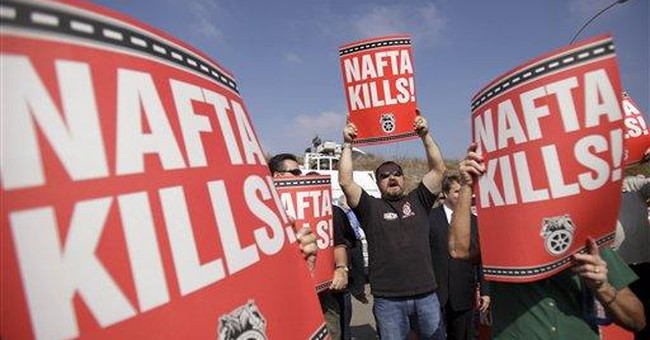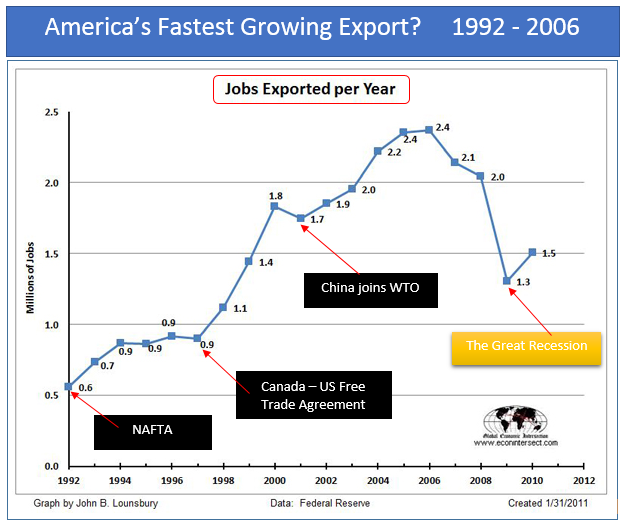
Posted on 02/04/2016 6:18:16 AM PST by Kaslin

One of Donald Trump's talking points and biggest applause lines is how "they" -- Japan, China and Mexico -- are "beating us in trade" and are "taking our jobs." He proposes tariffs, for example, on Chinese goods in retaliation for that country's alleged "cheating."
To someone who is out of work in an industry where foreign workers do what he or she once did, Trump-like protectionism sounds appealing. But Trump actually proposes punishing the American consumer. As economist Milton Friedman says, protectionism discriminates against low prices.
It is certainly true that many countries prop up or subsidize companies or even whole industries by providing capital or special privileges. This allows them to produce goods and services "below cost" -- or at prices below what a competitor could charge and still make a profit. But doing so also means that taxes in that country, which could have gone to a more productive use, are squandered to keep a company in business that otherwise wouldn't exist or would have gone out of business. This means consumers in other countries with which the "cheater" country trades can buy those imported goods at a cheaper price.
Trump proposes to retaliate by placing tariffs on those imported goods. But this prevents American consumers from benefitting from the "cheater" country's folly of propping up companies that would not survive but for the taxes spent to keep it alive. Why compound the stupidity?
Another justification for this kind of protectionism is that a foreign country "exploits" America through the use of "slave labor" which, as to wages, causes a "race to the bottom." Certainly forced labor, as when "blood diamonds" are mined by workers with guns pointed to their heads, is criminal and immoral. But free laborers offering to work for less money than others is how poor countries become wealthier -- by allowing other countries to buy goods more cheaply.
NAFTA, the North American Free Trade Agreement, established in 1994, has become exhibit A on how "we lose" on trade. After all, many American jobs have been "outsourced" to Mexico. But that looks at but one side of the ledger. That an American pays less for certain things frees up capital to spend on something or on someone else. A machinist sees his job "shipped to Mexico," but the planner or analyst hired by a company with the "savings" might not see the direct relationship between free trade and the fact that he or she has this new job. When NAFTA was debated, businessman and presidential candidate Ross Perot predicted "a giant sucking sound" as jobs and incomes would be lost to Mexico.
The American Enterprise Institute writes: "It is an article of faith among protectionists that NAFTA harmed American workers. ... The justification may be that NAFTA went into force at the beginning of 1994 and the U.S. trade balance with Canada and Mexico, two of our top partners, then deteriorated.
"But the American job market improved as these trade deficits grew. Unemployment fell more than two points from the beginning of 1994 through the middle of 2000. Already high labor force participation edged higher to its all-time record by early 2000. Manufacturing employment rose until mid-1998 and was above its pre-NAFTA level until April 2001. Manufacturing wages rose. The strength in the American job market from 1994 to 1999 is not due primarily to NAFTA, but it is plain that the job market, including manufacturing, strengthened after NAFTA."
Trump is also schizophrenic on this issue. On the one hand, he opposes illegal immigration, which most often is an economic decision where, for example, a poor, unskilled worker from Mexico sneaks into America to make money. On the other hand, Trump deems it unfair and a form of "cheating" if an American company relocates to or builds a factory in Mexico to take advantage of that unskilled Mexican worker's willingness to work for less.
If Trump were talking about the excessive taxes or regulations that induce American companies to leave the U.S. or to put factories in foreign countries, that would be one thing. The U.S. general top marginal corporate income tax rate is the highest in the industrialized world -- and, worldwide, is only exceeded by Chad and the United Arab Emirates. Unnecessary regulations also increase the cost of doing business stateside. But this is not Trump's argument.
About free trade, the father of modern economics, Adam Smith, in 1776 wrote in "The Wealth of Nations": "In every country it always is and must be in the interest of the great body of the people to buy whatever they want of those who sell it cheapest. The proposition is so very manifest that it seems ridiculous to take any pains to prove it; nor could it ever have been called in question had not the interested sophistry of merchants and manufacturers confounded the common sense of mankind. Their interest is, in this respect, directly opposite to that of the great body of the people."
Trump means well. But so what?
It's an assumption that the new manufacturing workforce will come from the welfare roles and fantasy that manufacturers will pay those people over $22 an hour. The fact is that the workforce will likely come from people employed in other areas or just out of school, and the manufacturers will pay them a little as they can get away with.
We need fair trade and cheap energy and automation. That’s our counter to cheap foreign labor.
>>>The Chinese import something from us?....
Yeppers. We give them lots of paper and the give us lots stuff for it.
Don’t forget there were perpetual arguments about how much the tariff would be and what it would be on. Decade after decade of yelling and screaming back and forth about tariffs. They were fund raisers for the government, but they were also political footballs.
Do you want to go back to that?
Absolutely yes! The socialist have been hiding behind the IRS and the income tax long enough!
Talk is cheap - if there were that many buyers the products would be on the shelves, free trade or no free trade.
But no! the protectionists want a big government thumb on the scales.
Protectionist are real Americans ans hate the income tax and prefer optional taxes like tariffs.
Here’s how it worked.
A person would go to walmart and see a nice product with good packaging: Made in America, for $4.50
Later, they see the same product for $4.50, but there is a cheaper product, $4, with cheaper packaging saying, Made in China.
But they buy the product from America.
After GATT or NAFTA, they still see the American product for $4.50. But, this time the product from China is $2.00.
This time they buy the product from China.
Maybe so, however Carl Ichan isn't and that is who is going to be doing trade negotiations
While Chinese made products are marginally cheaper. They are not 50% cheaper. The reason is labor is only a small part of the overall retail price for most manufactured product. For "Made in the USA" labor is 6-8% of retail for Chinese it is 2-3%, if you factor in the Chinese quality, which is usually much lower, the Made in USA product is a better deal.
What I was saying was the product was never worth $4, but after NAFTA and GATT they can charge a lower price while maintaining the same profit margin.
Why would a company go thru all the trouble of closing a factory in Peoria Ill and opening one up in China just to maintain the same profit level? Makes no sense. They charge the same for the product and pocket the increased profit margin. The stockholders would have it no other way!
bkmk
I understand the paradox and I did just make up some numbers. The real goal, in my opinion, has been two-fold, to increase corporate profits while de-industrializing the US and the West in general. There is a push to create a New World Order which really is just a global business environment where the real global governance is in these trade treaties. There will be trade zones, such as the North American, European, Asian, etc. Eventually a currency for each and maybe someday one for all. It’s a long plan that has been taking place for a very long time. This is what I’ve gathered from reading about this for years.
 I'd love to see the real data behind these claims.
I'd love to see the real data behind these claims.
Agree.
Correct, just don't expect anyone to listen though.
Not compared to other taxes. For 2014 total tariff revenue was $34B, a tiny fraction of other receipts totaling over $4,332B.
Tariffs served a valuable function
Raising tariff rates again could cut trade and mess up the economy but current low rates have made 2014 revenue the highest ever, more than the total of all import tax revenue from the nation's founding til 1955.
Traitors
Right, and so you're here to mete out capital punishment w/ your own hands? Name calling and death threats aside, eventually the nation as a whole has to accept economic realities on their own terms.
If the noose fits.....
I meant that raising revenue is the only legitimate function of a tariff. Behavior modification is not a legitimate use of a tariff, or any other tax.
Disclaimer: Opinions posted on Free Republic are those of the individual posters and do not necessarily represent the opinion of Free Republic or its management. All materials posted herein are protected by copyright law and the exemption for fair use of copyrighted works.